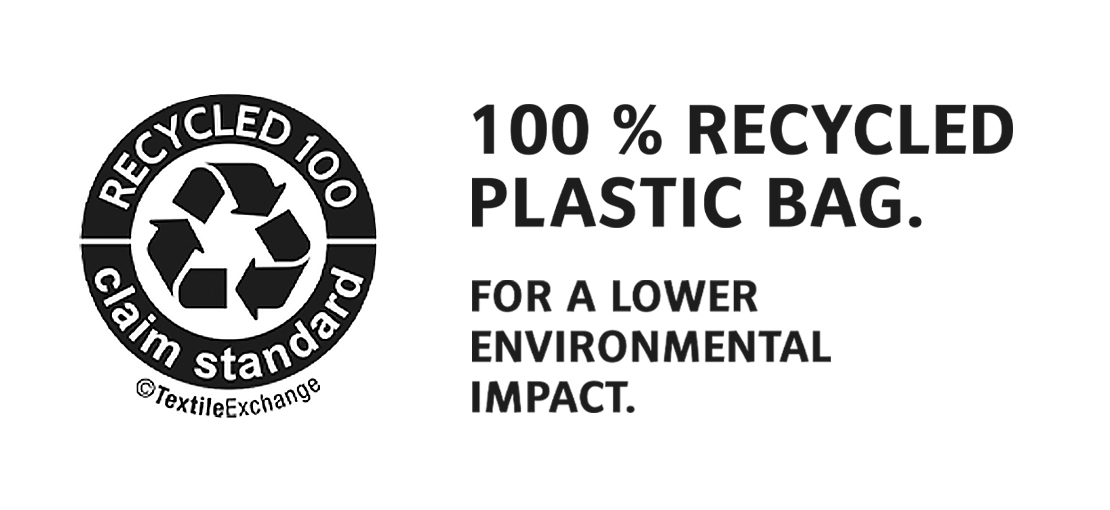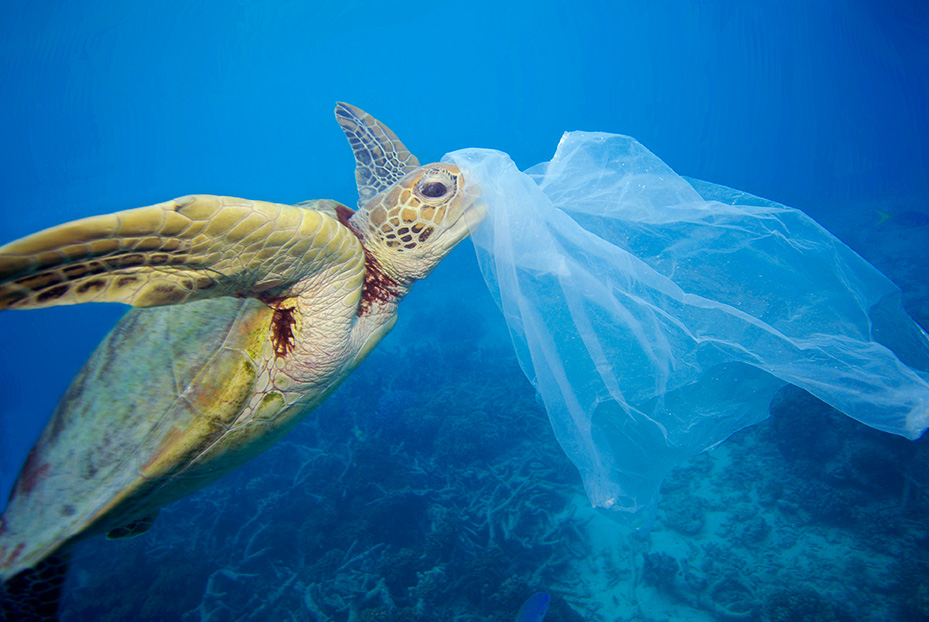
Packing problem: single-use plastics
The plastic bag problem
Plastic bags – they’re everywhere. In order to keep our products safe and clean until they reach your favorite store or your doorstep by post, our products have to be packed. There is currently no real alternative to this kind of plastic.
Single-use products waste resources
As with all single-use products, the biggest problem is not the valuable, highly functional, resource-intensive plastic material itself, but the fact that it is only used once for a short period of time. 95 % of all plastic packaging is neither recycled nor reused. What a waste! Even though the EU already bans individual single-use plastic products, packaging has not yet been affected.
Protection from damage is essential
Above all, the problem is transparent polybags. Every single product is packed in one:
- to protect it from moisture, mold and damage during transport
- because the shipping companies and warehouse logistics need them for bar code labels, etc.
- because many dealers demand them from us in order to protect the product during their processes and to simplify things
At the moment, we can’t just eliminate them – that’s the unfortunate reality.
Plastic packaging made from recycled materials
If we can't get by without polybags, we at least want to use ones made from recycled materials. This conserves fossil resources and reduces plastic waste as well as climate-damaging emissions.

The best thing would be if we could make new bags from post-consumer packaging. For example, from Germany's Yellow Bag Recycling Program in which used plastic packaging is collected from households. This would at least help close the loop for raw materials to some extent, if we still must use these plastic bags.
Unfortunately, using post-consumer packaging isn’t that simple. Since the content from the recycling program is always different, the quality of the plastic made from it also varies greatly. Sometimes it’s not stable enough, you can see "streaks" or other impurities, or it has a smell. That is why we are doing more tests together with our bag suppliers and trying to produce sufficient quality.
Until we succeed, we are taking an intermediate step and using polybags made from post-industrial plastic waste which is much purer and of a higher quality. Since the materials used would otherwise also have to be disposed of as waste, this is also considered a recycled material and is certified with the Recycled Claim Standard.
Nevertheless, we are trying to cut down on the use of plastic or reduce the size of our plastic bags where possible. To do this, we have tried folding products differently or rolling them so that we can use smaller bags. The results are sometimes less than satisfactory – many products come out very wrinkled. Would this be a problem for you? We welcome your feedback – just use the "Write us" link on this page!
Big problem for the textile industry
We know that the entire textile industry has a big problem here, and we all have to pull together to solve it – packaging manufacturers, outdoor brands, wholesalers and retailers, logistics partners and you as the consumer.
VAUDE is therefore working under the umbrella of the European Outdoor Group together with other brands and retailers to find alternatives to plastic bags made of disposable plastic. This is not just a matter of replacing one material with another. Rather, our goal is to think about packaging solutions in a completely new way and to change the single-use packaging system. We will continue to report on this here.
You can find the project website here where you will also find the newly developed Polybag Standard, which sets out best practice specifications for polybags.
And what about biodegradable packaging?
On the recommendation of the Federal Environment Agency, we do not use "compostable" plastics for disposable items such as packaging. Although these are theoretically biodegradable, they don’t actually decompose under normal conditions but only under industrial composting conditions at high temperatures and without an oxygen supply.
They are also problematic for compost or biogas production. In most cases, they decompose much more slowly than organic waste and end up causing blockages at conventional biogas plants where they have to be carefully removed from the compost and disposed of. This makes neither ecological nor economic sense.
They don't belong in plastic trash either. Since they are made of organic materials, they cannot be recycled. Here, too, they end up in residual waste.
Even the production of bioplastics isn’t environmentally friendlier. With the current state of technology, they require even more energy to produce than new plastics. Bioplastics are therefore only suitable for long-life products, not for disposable packaging.
We are therefore convinced that plastic packaging with the highest possible proportion of recycled material is currently the most environmentally friendly solution.
You can read about the conflicts and problems here
32 % of all plastic packaging ends up in the environment - primarily in Asia

The production of plastic worldwide has increased twentyfold in the last 50 years. Of the approximately 80 million tons of plastic packaging worldwide, an alarming 32 % ends up in the environment – by far the most in Asia. What is simply missing here is a regulated waste disposal system in which plastics are collected and sensibly recycled – even if only as fuel for electricity or heat generation.
VAUDE supports a large model project of the WWF, which is developing a waste management system in the ecologically particularly valuable Vietnamese Mekong Delta. The aim is not only to free the environment from the vast amounts of plastic, but also to raise awareness among politicians and the population. On the one hand, the threat posed by waste to the livelihoods of humans and animals and, on the other, the economic potential associated with the collection, sorting and recycling of plastics.
We are raising awareness of the problem among our suppliers in Asia, network them with the WWF in the project area, with the aim of increasing their contribution to concrete local solutions for the collection and recycling of plastics. More about the project here
Even the plastic industry has recognized the problem and is on its way to contributing to a solution.
Packaging at VAUDE: guidelines and amounts
Since 2014, VAUDE has had its own packaging guidelines for suppliers with clear instructions for maximum size, materials allowed and mandatory labeling that enables us to sort and recycle the packaging.
These guidelines are a component of our purchasing contract and are mandatory for all VAUDE products. We monitor adherence with random testing at our warehouse. We are currently in the process of revising the guidelines. Our goal is to work with our suppliers to make unavoidable packaging as environmentally friendly as possible.
The VAUDE Packaging Guidelines are available for download here.
Sales packaging for products manufactured at our Obereisenbach location (inventory-adjusted)
|
|
2019 |
2020 |
2021 |
|---|---|---|---|
|
Sales packaging for products from the Manufaktur OEB (inventory-adjusted consumption) |
15.8 tonnes |
16.7 tonnes
|
27.7 tonnes
|
|
Cardboard packaging |
13.5 tonnes |
15.6 tonnes |
27.0 tonnes |
|
Polybags |
2.3 tonnes |
1.0 tonnes |
0.7 tonnes |
Transport packaging for delivery of VAUDE products out of Obereisenbach to retailers (inventory adjusted)
|
|
2019 |
2020 |
2021 |
|---|---|---|---|
|
Cardboard, no less than 75% recycled paper |
264.6 tonnes |
222.5 tonnes
|
285.9 tonnes
|
|
Shrink foil |
256.0 tonnes |
214.7 tonnes |
274.9 tonnes |
|
Foils LDPE, LLDPE, HDPE, miscellaneous (transport packaging) (t) |
5.0 tonnes |
3.6 tonnes |
5,9 tonnes |
|
Polybag returns, ASB |
3.6 tonnes |
4.1 tonnes |
5.1 tonnes |
Sales packaging according to VerpackungsVO/VerpackungsG (for licensing. ALL products, not only for OEB).
|
|
2019 | 2020 | 2021 |
|---|---|---|---|
| Sales packaging according to VerpackungsVO/VerpackungsG (for licensing. ALL products, not only OEB). | 62.6 tonnes | 68.8 tonnes | 125.7 tonnes |
| Paper, cardboard, carton (t) (product equipment! E.g. shoe boxes, cardboard banderoles, etc.) | 52.4 tonnes | 55.0 tonnes | 107.3 tonnes |
| Plastics, films (t) (polybags and other plastic components of product equipment produced by the end consumer in the household) | 9.5 tonnes | 13.0 tonnes | 17.4 tonnes |
| Natural materials (t) (product equipment! Cotton cords, etc.) | 0.7 tonnes | 0.8 tonnes | 1.0 tonnes |
Transport packaging according to VerpackungsVO/VerpackungsG (for licensing. ALL products, not only for OEB).
|
|
2019 | 2020 | 2021 |
|---|---|---|---|
| Transport packaging in accordance with VerpackungsVO/VerpackungsG (for licensing. ALL products, not only OEB). | 324.6 tonnes | 293.6 tonnes | 419.3 tonnes |
| Paper, cardboard, carton (t) (Kolb, Mossmann etc., original cartons from production Asia, which are reshipped) | 302.2 tonnes | 267.1 tonnes | 391.3 tonnes |
| Films (t) (polybags disposed of at retail, pallet film, shrink film, packing tape, etc.)) | 22.4 tonnes | 23.3 tonnes | 28.0 tonnes |
Due to the increase in our production, we unfortunately had to use more sales packaging, but also fewer polybags as a result of the change in packaging. We were able to reduce the transport packaging by making some adjustments such as increased shipping in reusable boxes and direct shipping of original cartons from Vietnam.
For 2021, VAUDE exceeded this “de minimis limit” from the Packaging Act for the first time and has therefore prepared a declaration of completeness for all packaging placed on the market in Germany. This has been audited and approved by an auditor.
Wanted: new inspiration
The best packaging is that which we simply don’t use. If it were only as easy as it sounds... If you have any ideas, please share them with us! Just use the contact link on this page.
We have already long done away with plastic shopping bags in VAUDE stores. If you really need something to carry your purchases in, you can buy a paper bag.
WWF Packaging Recommendations
- Avoid plastic packaging, plastic bags and single-use items. Put your garbage where it belongs.
- Don’t use toothpaste and cosmetics with microplastic beads.
- Become informed about the toxins in plastics and avoid products made of PVC (polyvinyl chloride) and PC (polycarbonate).
| GRI: | 301-1 |
| GRI: | 301-2 |
| GRI: | 301-3 |




